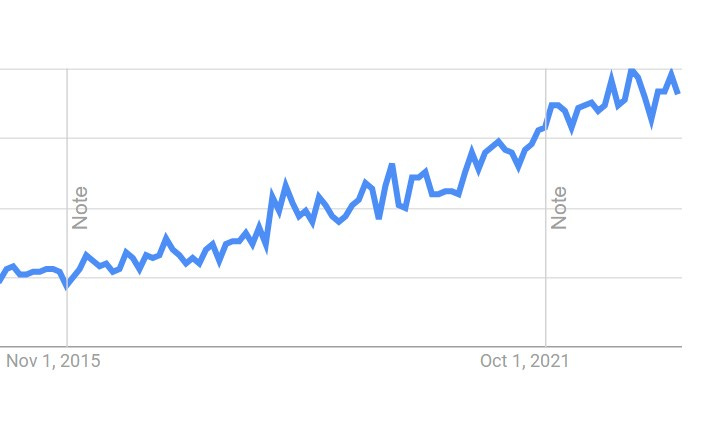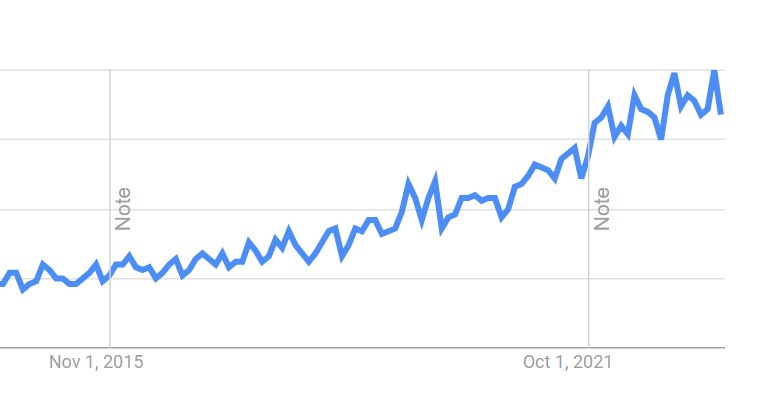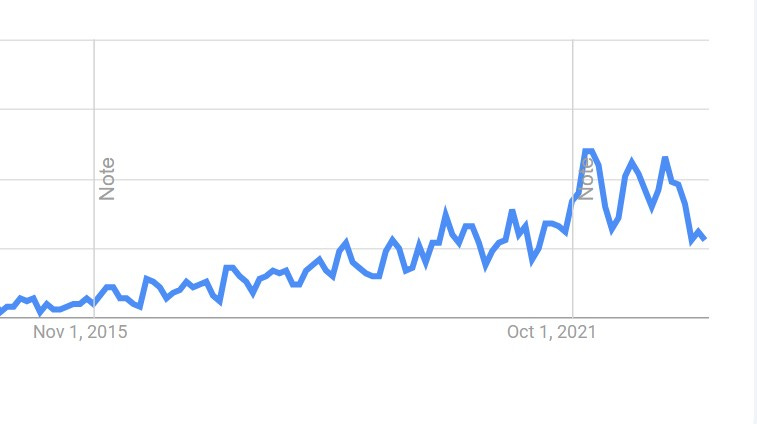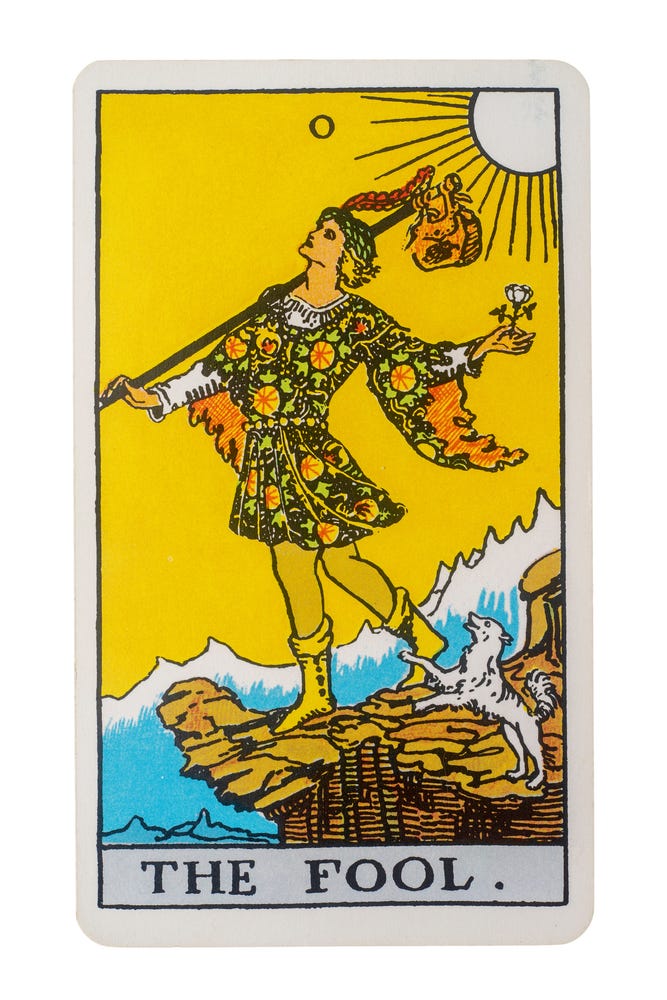Three Encouraging Graphs
Google search data suggests growing interest in our topic.
Resonant World #44
I’m no expert on Google searches, nor how to interpret the data on Google Trends, which I used to generate these three graphs.
Still, I thought it was impressive to see such a clear upward trend in the popularity of searches by Google users worldwide for the terms “healing trauma” (shown in the graph above); “trauma therapy” (below); and “transgenerational trauma” (below that).
“Culturally Cool”
Before we can begin to mobilise the kind of response needed to integrate our species-wide backlog of individual, ancestral and collective trauma, we obviously need to acknowledge that the problem exists — and this data suggests that’s starting to happen.
And then, as quantum ecopsychologist Zhiwa Woodbury (whose work on climate trauma is one of the main inspirations for Resonant World) suggests, the next step is to make integrating trauma “culturally cool.”
Here’s an excerpt from a podcast Zhiwa recorded a year ago with Merritt Juliano, founding co-president of the Climate Psychology Alliance North America for several years, and a member of the 2021-2022 American Psychological Association’s Task Force on Climate Change.
Zhiwa told Juliano:
“It’s no coincidence that the existence of democracy itself is being put in question at a time when life as we’ve always known it is also facing an existential crisis. That’s what happens when you don’t acknowledge your trauma — you act it out.
“We have this taboo in our society when it comes to trauma. The quickest way to trigger somebody is just to start talking about any kind of trauma. In a lot of social and cultural contexts and situations, it’s not socially acceptable — it’s rude. And so we have to overcome that obviously because we’re all dealing with our trauma. So we might as well do it with our eyes open.
“And it turns out that once you acknowledge your trauma, you are almost taking its power away. All of a sudden it’s exposed — all of a sudden you see how everything is influenced by it. And then it opens up the space psychologically, and in our hearts, to actually resolve trauma. And when you do that at the individual level, with yourself, and acknowledging the trauma that you’re bringing forward from your family, and your experiences, then immediately all your relationships start to change — in your family, your close relationships, and in your community.
“We need to make it culturally cool — not just culturally acceptable — but culturally cool to talk about trauma, to acknowledge the trauma underlying all the problems that we’re always dealing with, and to see it as a question of relationship. So having the humility to recognise that our relationships are not working — that we need to reform our relationships. And how do you reform relationships, by acknowledging that.”
I highly recommend listening to Zhiwa’s entire conversation with Juliano on Flooded: Climate Stories on and off the Couch.
The countdown is on to the start of the nine-day Collective Trauma Summit 2023 on September 26. Please do join myself and fellow co-hosts for conversations with more than 60 speakers, music, poetry and embodiement practices, and more. You can register for free here. Talks are viewable for free for 48 hours after they go online, and then upgrade packages are available to gain lifetime access.
Like any labour of love, Resonant World is written in the interstices between work I get paid to do, notably editing investigations at nonprofit climate news service DeSmog, and my Tarot reading practice (see below). It’s a huge boost when people becoming paid subscribes, and support of any amount affirms that Resonant World has value. Thank you!
Work with Me: Unearth your Inner Resources via the Tarot
I love supporting people to gain greater confidence and courage through the Tarot.
With the help of the 1,200 symbols of the Thoth Deck, we open a field of higher intelligence that points you to the inner resources that are patiently waiting to help you, but which you may not yet have fully learned how to access.
Likewise, the cards can help identify precisely which unconscious patterns have been holding you back, and provide guidance on how to dissolve them.
To be completely honest, even as a Tarot devotee, I’m often pretty amazed at the clarity of what comes through during readings, and I love seeing how refreshed and energised people look as the final card is turned.
I charge £70 / $90 for a session that typically lasts 90 minutes, including a guided meditation to establish a coherent field linking us with the cards. Sessions via Zoom: I can send a recording of the reading and a photo of the spread or spreads. (I am a member of the Tarot Association of the British Isles and abide by its code of ethics). Please email if you would like to book a session. Thank you!








Lovely: thanks Matthew.
On making trauma culturally cool ... as usual, Zhiwa nails something important., and whatever the graphs might mean to a seasoned Google-data-reader, they suggest that trauma-informed inquiry (and self-inquiry) is growing. Signs of trauma, and awareness of it, is everywhere. What if it always is? Some of Zhiwa's great gift has been to link personal, cultural and intergenerational trauma with the pressures and torsions at play in the overarching - superordinate - living system of which we are part. This system is the emergent through the dynamic interactions of all its elements both with each other and with the system as a whole as homeostasis is maintained. Because the system has been rendered invisible and somehow extraneous to human interests (all the better if one wishes to treat it as an inert, extractable resource), Zhiwa suggests that the only way we are likely to notice and engage with the processes of systemic equilibrium is when it impacts us. However, lacking the frame to "read it" fully we make meaning of the information in terms of ourselves and our past history and stories. Lacking the frames that enable us to commune with the greater system, we continue to push it to extremes - and unsurprisingly, all measures of trauma (including Google searches) increase.
All of which points to "trauma" as being what happens when feedback is ignored. A mechanical example - inertia and centrifugal forces are felt in our bodies when we're in a vehicle driving fast around corners. Usually, after a period of polite, white-knuckled dismay, we ask the driver to slow down. If the driver refuses, we may feel increasingly angry, then powerless and at mortal risk. Our distress increases, potentially off the scale - and, perhaps, the vehicle leaves the road. There can be a sense of power in driving fast, in over-riding feedback, in sensing other's powerlessness and - if the vehicle takes the corner - in being able to claim there was never a problem.
The example here is somewhat akin to Thomas Berry's noticing of the tendency for our dominant world-view to perceive the world as "a collection of objects" - driver, passenger, vehicle, gravity, curve etc - colliding together.
In terms of the levels of awareness involved, I could only hazard guesses about the driver and passenger! However, the relationship between energy and power is both direct and metaphorical - as is the sense of being engaged with forces - including gravity - far greater than ourselves. Approached in the spirit of individually-focussed competition, each object accruing power by abstracting energy to itself - whether interpersonal energy or that of fossil fuels - collision is inevitable. Berry contrasted the object-centred paradigm with that of recognising a "communion of subjects".
Whilst the exchanges of this communion on the bigger scale can be recognised in the various spheres - atmosphere, biosphere and so on - theres also the mostly unrecognised "psychesphere" of all life (and maybe all existence).
Given that, trauma is surely inevitable when there is no common holding and shared awareness of our personal experience within that of the whole, because there's no shared, receptive, empathic place to explore it - so we are cast back on ourselves and half-remembered/wholly enmembered stories of distress.
So I'm wondering - literally.
Wonder: the under-noticed emotion. Our psychology, leaching into our communal understanding, tends to recognise "mad, bad, sad and glad" as the 4 proto-emotions that shape our experience. It is mostly accepted that emotions give us information about our relationship with needs (mad/anger - about boundaries; bad/fear - about safety; sad - the need for compassion and soothing; glad - the need to celebrate). But surely, confronted by being part of something greater than ourselves, we experience wonder. And the need, therefore, to connect to this greater "being part of", not only cognitively but also physically and emotionally. And spiritually, although that is already present in the being of this.
Maybe this need for being part of the greater slips in to the reductionist worldview in the fascination with statistics of disaster (including Google-researching...?) into the windspeed of hurricanes, the height of storm surges, the extent of fires, the extent of collapse and so on.... and yet, lacking the common space to reach through to these reminders and recalls to wonder, we end up tumbled into private overwhelm... and the lonely trauma of that....
so - to wonder - together....